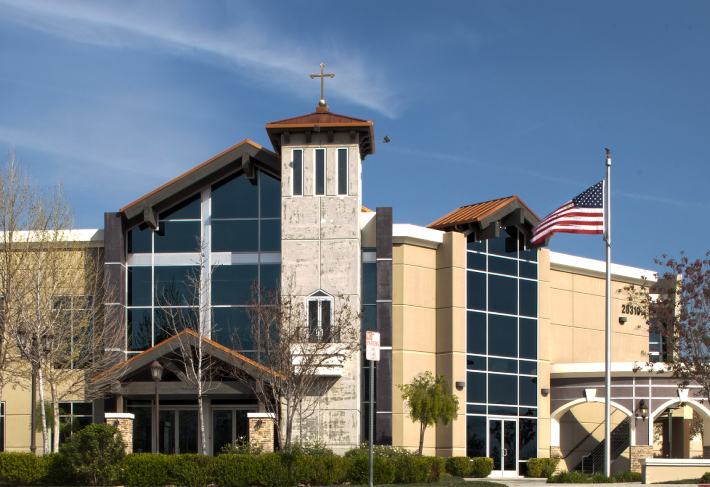FAMILY - EDUCATION & ENRICHMENT
SCV Education News
November, 2020 - Issue #194
 courtesy of Shutterstock |
Legacy's Mechanical Engineering Enrichment Builds
More than 3D Printers
How do you teach classical engineering to seventh and eighth graders - without losing their interest or "dumbing down" concepts? You put them in safety glasses, hand them tools they've never seen and show them how to build a 3D printer from scratch.
Legacy enrichment teacher Jerry Johnson - a tech entrepreneur with a passion for education - turns the theoretical into the practical. "In our Mechanical Engineering classes, students are attaching bolts and fasteners; using a T-square; evaluating adhesion properties; loading software; observing the relationship between torque and speed; testing pulleys, belts and gears; studying motion with motors and so much more. We're engaging in various forms of engineering - from electrical to mechanical and beyond - all while building a personal 3D printer that has high functionality."
The course - one of Legacy's star STEAM (Science, Technology, Engineering, Art, Mathematics) curriculum, enrichment and programming elements - builds more than a state-of-the-art printer. "Students are refining their problem-solving skills at every turn in our STEAM coursework," explains Head of School Matt Millett. "Learners might build - and then take apart - a portion of their project a dozen times, working to identify mis-alignments, missing parts or other issues. This doesn't just teach engineering - it teaches patience with the process and resilience while also growing students' confidence and excitement for learning."
"With hands-on education, coupled with Legacy's small class size, LCA's learners are able to deeply explore concepts and applications that are usually not introduced until the high school or college level. On any given day, they're directly engaging with theories they can observe up close in real time, in real life," says Millett.
Legacy Christian Academy 257-7377
Don't Miss Legacy Christian Academy's Live Kindergarten Q&A
Held on October 22 at 6:30pm on YouTube, meet Legacy's admin team and discover how your child can begin to create their own legacy with LCA's accelerated academics and Christian culture.
youtube.com/c/LegacyMediaSCV
SCVi is a Safe Space for Social-emotional Learning in Middle School
Middle school is a difficult time for many young people who are figuring out who they are and developing into unique individuals.
The middle-school years can bring promise, joy and excitement, but they can also be filled with the stress of trying to fit in.
At SCVi, they see the whole child - not just academic performance but each child's unique challenges and strengths, as well. While SCVi Charter School facilitators ensure their project-based curriculum meets state standards, they also incorporate social-emotional learning as an essential part of the learning process.
While learners of all ages benefit from SCVi's emphasis on social-emotional learning, the middle school years are an optimal time for this focus - and new-to-SCVi learners seem to benefit the most!
Their middle-school team develops projects that make learning fun and foster confidence that can often take a hit in sixth, seventh and eighth grade.
SCVi empowers young leaders to thrive through these pivotal years.
ileadsantaclarita.org
 |
The Three Stages of Classical Education
What makes classical education so effective? It is largely because of its approach to how and when students are taught. Regardless of their learning style, children learn in three phases or stages - grammar, logic or dialectic and rhetoric - known as the trivium. In the grammar stage (Kindergarten through sixth.), students are naturally adept at memorizing through songs, chants and rhymes. If you can get children in this stage to sing or chant something, they will remember it for a lifetime.
In the dialectic or logic stage (Grades seventh and eighth.), teenage students are naturally more argumentative and begin to question authority and facts. They want to know the "why" of something - the logic behind it. During this stage, students learn reasoning, informal and formal logic and how to argue with wisdom and eloquence.
The rhetoric stage (Grades ninth through twelfth.) is naturally when students become independent thinkers and communicators. They study and practice rhetoric, which is the art of persuasive speaking and effective writing that pleases and delights the listener. It is this approach to teaching students based on their developmental stage that makes classical education so effective.
Trinity Classical Academy 296-2601
 |
Congratulations, Saugus High Centurion's Social Studies Teacher Named "Teacher of the Year"
Saugus High School social studies teacher Jim Klipfel has been named a Los Angeles County Teacher of the Year by the county's office of education (LACOE), representing the best of the profession in the state's largest honors competition for Kindergarten-through-12th educators.
It's National Bullying Prevention Month
Teach your Children to Act with Kindness, Acceptance & Inclusion
National Bullying Prevention Month is a wonderful opportunity to prevent bullying by encouraging everyone to act with kindness, acceptance and inclusion. This year, a worldwide pandemic and a growing movement for racial equity and social justice have highlighted the need to unite communities for a better future.
This month-long event is also a time to show solidarity for the one out of every five students who report being bullied each year. Bullying isn't a childhood rite of passage; it has real implications for a child's education, health, and safety now, and well into their future.
PACER's National Bullying Prevention Center offers age-appropriate resources to help students, parents, educators, and community members address bullying. Find resources for parents and educators online.
pacer.org/bullying
|
||||||||||||||||||||||||||||




